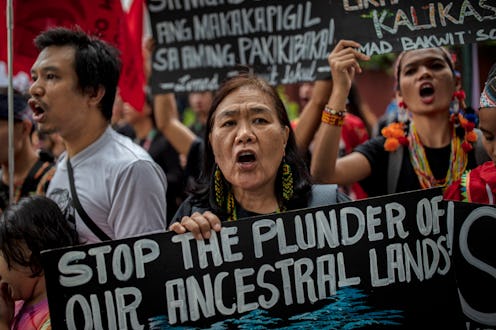Taking Action
8 Organizations To Support On Indigenous Peoples' Day
Here’s where you can donate this Oct. 11.

Columbus Day, which commemorates Christopher Columbus' arrival in the Americas, has been recognized as a federal holiday since the 1930s. But after Berkeley, California, renamed Columbus Day as Indigenous Peoples' Day in 1992, people have urged their cities and states to do the same. This year, if you'd like to celebrate Indigenous Peoples' Day by taking action, there are plenty of Indigenous rights organizations to support — today and through the rest of the year.
The history of Columbus Day is inextricably connected to the systematic extermination of Native American people by European settlers. This legacy continues to affect Indigenous people today. Native American women face one of the largest gender pay gaps of different ethnic groups, earning 60 cents for every dollar a white man earns on average, according to Equal Pay Today. As Deb Haaland, the secretary of the interior and one of the first Native American women elected to Congress, wrote on Native Women's Equal Pay Day in 2019,
The disparity in Native women’s pay wouldn’t be surprising if the general public knew about the other disparities that exist in Indian Country. Native populations suffer from chronic disease, poverty and education gaps at disproportionate rates.
Native communities are often left out of the equation and off the radar of mainstream media. It is part of the reason why the crisis of missing and murdered indigenous women has gone unaddressed for so long.
Taking history and these disparities into account, over 100 cities and a handful of states including New Mexico, Minnesota, Alaska, Vermont, and Oregon celebrate Indigenous Peoples' Day to honor Native American people and raise awareness. In 2021, Joe Biden became the first American president to formally acknowledge Indigenous People’s Day in a proclamation, writing, “For generations, Federal policies systematically sought to assimilate and displace Native people and eradicate Native cultures. Today, we recognize Indigenous peoples’ resilience and strength as well as the immeasurable positive impact that they have made on every aspect of American society.”
If you want to show where you stand on the second Monday in October, you can support the various organizations that are working to protect, support, and empower Native Americans and other Indigenous people across the world.
1American Indian College Fund
The American Indian College Fund is the nation's largest charity that supports Native American students who want to attend college and graduate school. The organization raises money for scholarships, academic resources, and more for students. It also supports 35 tribal colleges and universities (TCUs). You can donate here.
2Cultural Survival
Cultural Survival is an organization that advocates for the rights of Indigenous peoples and "supports Indigenous communities’ self-determination, cultures and political resilience," per its site. The non-profit is based in Cambridge, Massachusetts but works on-the-ground with Indigenous people all over the world. You can donate to Cultural Survival's mission here.
3Native American Rights Fund
The Native American Rights Fund provides legal resources and representation to Indigenous people and organizations around the world. Specifically, it "focuses on applying existing laws and treaties to guarantee that national and state governments live up to their legal obligations," per the site. You can donate to the non-profit here.
4Survival International
Survival International is a self-described "global movement for tribal peoples." The mission statement for the organization reads,
We stop loggers, miners, and oil companies from destroying tribal lands, lives and livelihoods across the globe. We lobby governments to recognise [sic] indigenous land rights. We document and expose the atrocities committed against tribal people and take direct action to stop them. We give tribal peoples a platform to speak to the world.
You can volunteer for Survival International, or consider helping the organization by signing petitions or hosting a fundraiser. Information on all of those options is available on its "Get Involved" page.
5International Work Group For Indigenous Affairs
The International Work Group for Indigenous Affairs is "a global human rights organization dedicated to promoting, protecting, and defending indigenous peoples' rights," according to its site. Every year, the organization publishes its annual report, "The Indigenous World," which provides in-depth updates into the state of Indigenous cultures around the world. You can donate to the organization here.
6Indigenous Environmental Network
Indigenous Environmental Network is a non-profit that seeks to protect the earth from "contamination and exploitation" through "strengthening, maintaining and respecting Indigenous teachings and natural laws." You can donate to the organization here.
7Indian Law Resource Center
The Indian Law Resource Center provides legal assistance to Indigenous people, specifically to combat racism and oppression, per its site. More specifically, it "seeks to overcome the grave problems that threaten Native peoples by advancing the rule of law, by establishing national and international legal standards that preserve their human rights and dignity, and by challenging the governments of the world to accord justice and equality before the law to all indigenous peoples of the Americas."
You can donate to the Indian Law Resource Center here.
8Coalition To Stop Violence Against Native Women
The Coalition to Stop Violence Against Native Women was founded by three Native women, according to its site, and aims to "provide support to other Native advocates working in domestic violence, sexual assault, dating violence, stalking and sex trafficking in New Mexico’s tribal communities." You can donate to the coalition here.
This article was originally published on